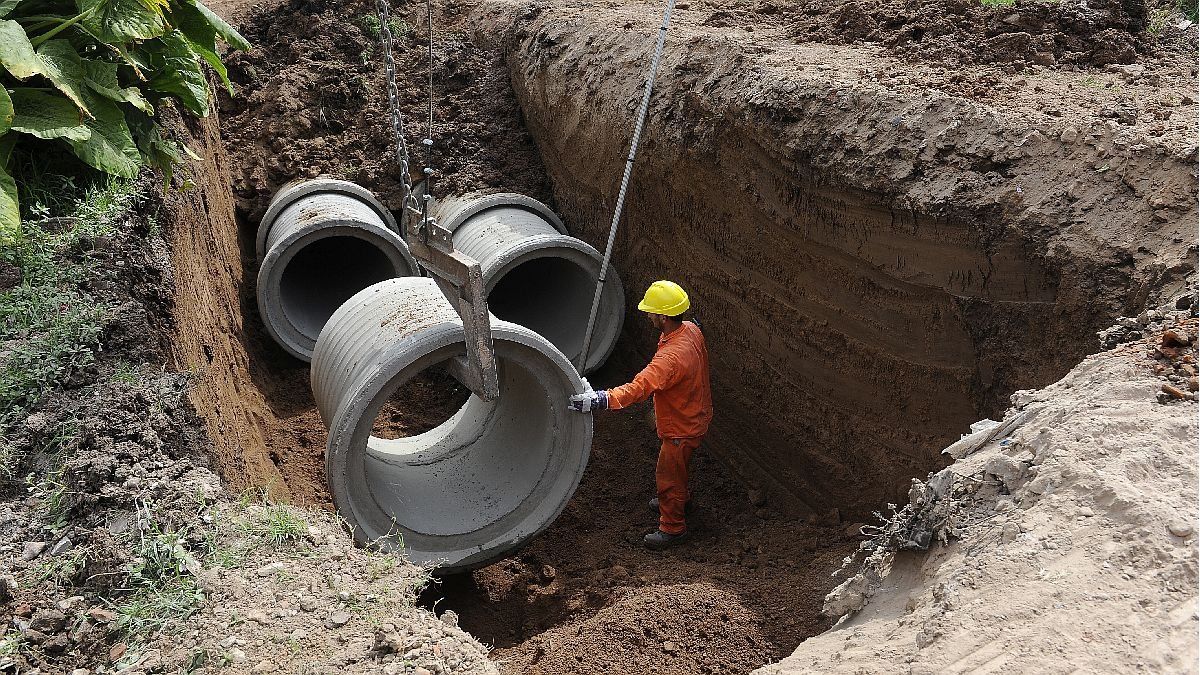The announcement of Minister of Economy, Luis Caputoof the Government’s decision to close the National Entity for Water and Sanitation Works (ENOHSA), an organization created in 1995 to manage public works linked to water and sanitary infrastructure throughout the country, generated concern in several provinces. This is because part of the public works paralyzed since the inauguration of the president Javier Milei They were in charge of that organization and their resumption was expected. “Honestly, the uncertainty is very great, we do not know what is going to happen,” said the Minister of Public Works and Services of La Pampa, Alfredo Intronati.
Caputo’s subsequent clarification that the projects that were in process will be transferred to the orbit of the Undersecretariat of Water Resources did not serve to bring peace of mind either, since the completion of the works is subject to the Nation guaranteeing the funds and the constant in these In recent months from the Casa Rosada it was backing up games, despite the agreements it signed with provincial governments. From some districts it was admitted that the agreements are not being fulfilled.
“Great damage”
“The Government is doing enormous damage and in La Pampa it affects the construction of sewers in the municipalities of Winifreda, Eduardo Castex, Alta Italia and other projects in General Pico that are now being carried out with provincial financing, although by contract the Nation should invest “Intronati said. “The damage to public works in this short time of President Javier Milei is irreversible because it suffocates the provinces but also affects the quality of life of the people,” added the Pampean official.
From Chubut, the president of the Provincial Water Institute (IPA), Esteban Parraexpressed surprise at the decision on ENOHSA. “It was always a fundamental tool for financing drinking water and sanitation works, so it is definitely not good news,” he said. He explained that in the last two decades, numerous works were financed by this entity: “Practically 90% of the large water supply and effluent treatment projects in the province were financed through ENOHSA”.
Parra highlighted that the organization was key to accessing international financing for large-scale works and that it was possible due to its technical excellence. “There was always a technical control because it was the first step to credit the funds for large works,” he said. Among them, pointing to Puerto Madryn Aqueduct that “the section from the river intake to the water treatment plant is still pending and is a very necessary work.” “Now we don’t know what will happen,” he concluded.
“It is another hard blow for the municipalities”
“The closure of ENOHSA is another hard blow for the municipalities. In our city it allowed us to carry out very expensive water and sanitation works and we carried out the technical project of the aqueduct to bring water to Kaleuche, a work that was paralyzed last December,” expressed in an interview mayor of San Martín de los Andes, Carlos Saloniti.
The provincial head of the tourist municipality of Neuquén insisted that the dissolution of the organization will directly affect small administrations due to the service it provided in technical and financial assistance and to “promote research and technological development in the water and health sector.” He stressed that the organization “also controls the quality of drinking water and the sanitation service.”
New delays
From Río Negro, the superintendent of the Provincial Water Department (DPA), Pedro Sánchezwarned about the consequences of the stoppage of important projects that are in charge of ENOHSA. “There were few sites with active works, mainly those that have international financing,” he said. He explained in contact with the press that the Government’s decision could affect drinking water works planned for Viedma and Catriel. In the case of the first city, the project reached 10% progress until December of last year and its continuity was suspended due to the financial impossibility of the province to pay for it, he explained.
In this province there are two works that have international financing, through the Inter-American Development Bank (IDB): the General Roca Sewer Master Plan, which is at 29% and active since July and the Catriel Sewer Plant, which is at 25% and active. Both the DPA and the Minister of Public Works himself, Alejandro Echarren, indicated that the closure of ENOHSA would imply the transfer of these projects to another organization, which would be the Undersecretariat of Water Resources, but that will generate new delays.
“One more step to destruction”
Fernando de Vido, former head of ENOHSA and current president of the board of directors of the Formosa energy distribution company (REFSA)considered that the decision is “one more step towards the destruction of an organization that is part of the State, which is the one that provides the regulatory framework and sets national policies for something as important as drinking water and sanitation.” He recalled that in his province, the capital had 22% with sanitation service in 2003 and without major possibilities of expansion, but the percentage grew to 70% until December of last year and extended to different neighborhoods.
“The entity was the governing body that allowed small cooperatives, municipalities and provinces to access different sources of financing and international credit taken by the provinces or municipalities. The intention to continue destroying common values, such as an organization, is clear. that set policies for all water and sanitation services in the country,” he noted. He emphasized that the official decision will harm, above all, the most vulnerable sectors, recalling that in Argentina more than nine million people do not have access to drinking water.
“Hopes are extinguished”
consulted on Tucumán provincial legislator Gerónimo Vargas Aignasse, former regional head of ENOHSAregarding the decision to put an end to the entity, pointed out that it is “the vision of an absent State and it is a mistake because we need a present and efficient State that does not spend more and that we can control to provide opportunities.” “It will have a negative impact on the interior of the country because it approved the projects for water and sewage networks, treatment plants and purification plants throughout the interior of the country. If the State does not arrive, no one will arrive. The ENOHSA is 61 years old, the hopes of many people in the interior are extinguished,” he said.
Source: Ambito
I am an author and journalist who has worked in the entertainment industry for over a decade. I currently work as a news editor at a major news website, and my focus is on covering the latest trends in entertainment. I also write occasional pieces for other outlets, and have authored two books about the entertainment industry.




